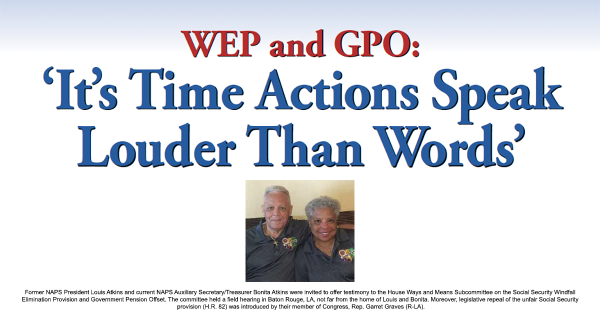WEP and GPO: 'It's Time Actions Speak Louder Than Words'
Following is the statement from former NAPS President Louis Atkins and NAPS National Auxiliary Secretary-Treasurer Bonita Atkins for the Nov. 20 hearing in Baton Rouge, LA, by the House Ways and Means Subcommittee on Social Security titled, “Social Security’s Disservice to Public Servants: How the Windfall Elimination Provision and Government Pension Offset Mistreat Government Workers.”
Chairman Smith and members of the committee, thank you for providing us this opportunity to share our views and the views of the 47,000 postal supervisors, managers and postmasters represented by the National Association of Postal Supervisors (NAPS) regarding the unfair and punitive Social Security Windfall Elimination Provision (WEP) and Government Pension Offset (GPO). We appreciate the zeal with which our member of Congress, Rep. Garret Graves, has advocated for elimination of the WEP and GPO.
Mr. Chairman, we both loyally served the American public during our careers. Louis performed non-federal work for 22 years. He was employed by the U.S. Postal Service for 32 years and served in the military for two years. Bonita worked for the Social Security Administration for 42 years, but has not attained 40 quarers of Social Security coverage.
Although now retired, we both remain active members of NAPS and are proud that NAPS strongly supports enactment of H.R. 82, legislation to repeal the WEP and GPO. We are attentive to the politics that reshaped the Social Security system 40 years ago to bolster the federal retirement safety net.
However, that decades-old bipartisan salvage effort resulted in significant financial harm to millions of American retirees. These are individuals not covered by Social Security during their employment, yet are eligible for Social Security benefits through a deceased spouse or on their own through Social Security-covered work history.
Before 1984, all federal and postal employees participated in the Civil Service Retirement System (CSRS). These members of the federal service did not participate in Social Security while employed by the government or by the U.S. Postal Service. However, because of the 1983 Social Security Act, federal and postal employees subsequently hired were required to participate in Social Security.
In anticipation of the sunset of CSRS participation, the Federal Employees Retirement System (FERS) and Thrift Savings Plan (TSP) were created to dovetail with Social Security. The goal of Congress was to replicate the value of CSRS annuities post-1983 for federal and postal hires. Generally, FERS retirees are not adversely impacted by the WEP or GPO.
However, we are not FERS annuitants. We are entitled to CSRS annuities and both suffer the financial repercussions and inequities of the WEP. And one of us will experience the indignity of not receiving a Social Security survivor benefit to which he or she will otherwise be entitled as the result of the GPO.
The WEP applies to both of us because we are CSRS annuitants and otherwise would be eligible for full Social Security benefits. About 2 million other Americans are impacted by the WEP, which was enacted in 1983. The convoluted and unfair application of the WEP formula reduces our Social Security significantly, effectively penalizing us for our public service.
The GPO will eventually penalize one of us—that is, the surviving spouse—on the death of the other. About one-quarter of a million Americans are impacted by this law enacted in 1977. The GPO would effectively zero-out our otherwise entitled Social Security survivor benefit. The prospective entitled benefit would be reduced dollar-for-dollar by the amount earned through federal or postal employment.
Clearly, the combined impact of the WEP and GPO has a financially damaging effect on millions of Americans and on us personally. The impact hits during the period of our lives when we can least afford it. Furthermore, Americans who earned their livelihoods serving in the public sector did not do it enrich themselves. Nevertheless, we are particularly affected by the WEP and GPO.
Federal and postal retirees who spend their retirement years on fixed incomes can ill-afford the consequences of reduced retirement income. Health costs continue to escalate and episodes of medical care increase in frequency. Assistive appliances and technology to make our senior years endurable and manageable at our homes are pricey and the possibility of needing expensive, long term-care is real. Therefore, reductions to Social Security benefits are extremely painful.
Ever since the WEP and GPO were enacted, NAPS has worked tirelessly to have Congress repeal its 40-year-old mistake. Over the past four decades, Congress has gone through the motions and promoted efforts to rectify the situation, but ultimately failed to advance corrective legislation. Regrettably, the collective efforts of many employee and retirement organizations representing millions of Americans who served the public in federal, state and municipal positions proved futile to persuade Congress to retract the WEP and GPO.
Time and time again, members of the House and the Senate have introduced WEP and GPO repeal or reform bills. These measures attracted overwhelming bipartisan support; there were promises of meaningful consideration. However, at the end of each congressional session, the refrain has been, “Wait until next year.”
Late last Congress, WEP-GPO repeal legislation earned a place on the House consensus, forcing the Ways and Means Committee to report the measure to the floor—albeit without a favorable recommendation. Maddeningly, the clock ran out on the bill when the 117th Congress adjourned.
It’s time that actions speak louder than words. This committee must favorably report H.R. 82 to the House floor; House Speaker Mike Johnson, who hails from this great state of Louisiana, must ensure a floor vote. NAPS urges the Ways and Means Committee to favorably report H.R. 82 and for the united Louisiana congressional delegation to urge Johnson to schedule the bill for a floor vote.
Thank you.
